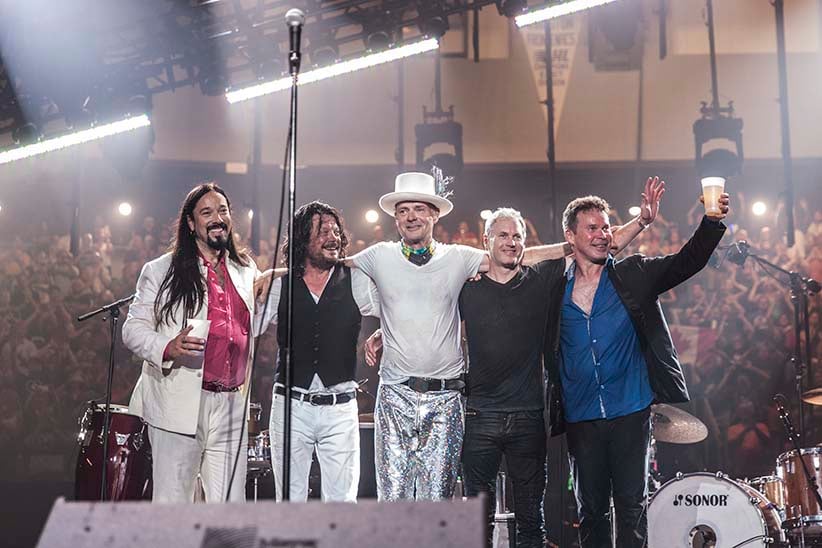Letters: ‘Three hours of sadness and joy’
Maclean’s readers write in

The Tragically Hip wave to the audience at the end of their last concert, in Kngston, on August 20th, 2016. (David Bastedo/The Tragically Hip)
Share

Too Hip for the squares
Over the past few years friends would ask me why I go to so many Tragically Hip shows, multiple nights, travelling to the States for a theatre or club show. My answer was, “One of these will be the last show, and I don’t want to miss it.” Never had I imagined the “last show” would be preceded by such devastating news. Luckily, amazingly, I was in the building at the Kingston show (“ ‘We came to support Gord,’ ” Tragically Hip, Sept. 12). It was three hours of sadness and joy—amazingly more celebration than tears—that I wish could extend for many more decades.
Ed Goffin, Stittsville, Ont.
I have not been familiar with the Tragically Hip music but tuned in from time to time during their performance. I could not make out a single word that Gord Downie was singing/shouting nor could I find any melody to hum along to. Am I missing something?
Ken Page, Toronto
I have to question Jim Cuddy’s quote: “When audiences saw the Hip for the first time, they thought, even subconsciously, ‘Finally our own band’ ” (“A duty to celebrate,” Tragically Hip, Sept. 12). I remember Burton Cummings shouting out at U.S. concerts, “We’re from Winnipeg, Manitoba, CANADA!!” Proudly the Canadian flag hung on stage. They mentioned Canadian place names in songs like “Running Back to Saskatoon.” If you didn’t like the Guess Who you were thought of as being unpatriotic (seriously!). With all due respect to the Tragically Hip and the courageous Gord Downie, the Guess Who were the first Canadian band to really put Canada on the map.
Brenda McCarthy, Calgary
Certainly the Hip have earned a place among Canada’s cultural icons, but 24 pages about them is beyond excessive. What of the hundreds, perhaps thousands, of similarly clever and creative Canadian artists who live their lives in obscurity because they never have the luck to be in the right place at the right time as the spotlight sweeps by? Success in the music biz depends more on good marketing than good music. In future, please try to balance coverage of artists to reflect their true cultural significance without overstating their actual importance.
David Tanner, Cobourg, Ont.
Your extensive coverage of the Tragically Hip’s “final” tour and enduring legacy was very much appreciated. Having achieved status as both a rock star and poet, and facing a dire medical prognosis, Gord Downie could have focused on himself, perhaps becoming pessimistic and bitter in the process. Instead, with his largest audience ever, he highlighted social justice (or lack thereof), and reminded us of the important work we face in repairing Canada’s tarnished relationship with Indigenous Canadians. I, like millions of others, will gratefully remember and cherish the Hip’s vast contribution to Canada’s rich artistic cultural tapestry, believing wholeheartedly that it will remain unmatched for the foreseeable future.
Robert M. Beeksma, Richmond, B.C.
Save the world
After reading Terry Glavin’s “The face of total global neglect” (International, Sept. 12) and Sally Armstrong’s “ ‘Bring back my people’ ” (International, Sept. 12), I’m struck by how such unspeakable acts of evil and unimaginable cruelty against human beings still happen in the 21st century. The Middle East is truly a cauldron, where political alliances between the major powers and territorial interests still rule the day. When will our leaders of the free world step up and put away their differences and put an end to these inhumane and merciless atrocities?
Brian Davidson, Pincourt, Que.
Thank you Terry Glavin and Sally Armstrong for your excellent articles on the horrors of the Assad regime in Syria and the horrific treatment of male and female victims of ISIS. Our acceptance of more than 25,000 refugees is commendable. But next we have to agree that the basic actions and abuses that create refugees must be effectively dealt with. We must ask more of our government on our behalf.
Michael Wiggin, Ottawa
Just like any other conflict, the world cares a while and then forgets. The Assad regime is certainly murderous and corrupt, but we often omit to mention the rebels’ share of the killing and pillaging. Islamic State is but the most extremist of dozens of loosely affiliated or rival rebel groups, whose members are either self-declared jihadists or Wahhabi-sponsored “moderates.” Terry Glavin seems to believe the rebels (except Islamic State) are docile idealists chased down by Goliath, whereas in fact they might turn out to be the new Taliban, if not much worse.
Fabian F. Bargout, Montreal
While Syrian President Bashar al-Assad may rate as a villain, he is a lesser one of many. Once the Syrian rebellion began it was the president’s prime duty, as with all heads of government (from Lincoln in the 1860s to Trudeau in the 1970s), to suppress it and preserve the nation. The disparate rebel groups, including ISIS, embedded themselves among the civilians, using civilian casualties as a weapon against the regime. Had the West permitted Assad to crush the rebellion from the outset, none of the ensuing horrors— from casualties to refugees to ISIS—would have arisen.
Donald McKay, Calgary
Glavin provides us with yet another guilt-inducing, feel-bad story about the Syrian conflict that offers no ideas whatsoever for possible solutions. Playing on people’s emotions and making readers feel bad is easy. Suggesting viable solutions is the hard part, which is likely why none were offered.
Melissa Illes-Brooks, Toronto
Tax failure
The Sept. 12 Editorial on carbon pricing suggests that B.C.’s $30/tonne carbon price has accomplished so much over the past eight years that no increase or change is necessary. To the contrary, Christy Clark’s government has frozen the tax at $30/tonne since 2012 and exempts natural gas development, leading to a policy failure. Her 2008 goal—a 33 per cent reduction of greenhouse gas emissions by 2020—is now unreachable. In fact, emissions increased from 60.7 megatons in 2009, the first full year for the tax, to 62.9 in 2014. You don’t need to be part of “the environmental lobby” to conclude that whatever its merits, the current plan is not working.
Richard Starr, Dartmouth, N.S.
Why not boycott China?
Our second-largest trading partner, China, is one of the biggest human rights abusers in the world (“Why China needs more Canada,” Evan Solomon, Sept. 12). Imprisonment, religious persecution, torture, denial of medical treatment, executions and suppression of the press are the fate of dissidents. Here at home we have the Green party accepting the Boycott, Divestment and Sanctions movement against Israel, a small democratic country surrounded by enemies vowing to destroy her—while the Liberals are courting a Communist, human-rights-abusing country for its money and goods. Something is rotten in Canada.
Cherryl Katnich, Maple Ridge, B.C.
The wrong man
In “The end of reason” (International, Sept. 12) you refer to the dead soldier whose parents spoke at the Democratic National Convention as an Arab American, but he is a Muslim American. His family is from Pakistan. Big difference.
Raman B. Chauhan, Ottawa
A gold in medicare
With all due respect to the incredible achievements of individual athletes, the Olympic Games should never be misconceived as a source of national pride (“The breakthrough Games,” Society, Sept. 12). The Olympic Games are mere spectacle, a show wherein the world’s wealthiest nations employ the best coaches, equipment and technology to demonstrate an entirely predictable “superiority” over poorer nations. There are many better reasons for citizens to rejoice in the achievements of their nations. Canadians and most Europeans can feel very fortunate to live in states that provide socialized health care and education, sustain a vibrant middle class, and value tolerance and law and order. Attributes such as these are truly worthy of national pride, for they are principles that can’t be won or lost in a two-week sporting event.
Mike Ward, Duncan, B.C.
Shame on the media. I just returned from the Olympics in Rio along with 10 selected student athletes. The media did everything it could prior to the Olympics to discourage people from going. Rio and its people were fabulous. We made Canada proud as we followed our athletes with flags and banners and cheers. What a lesson our students had in international relations, and what a joy it was that as Canadians we found out how much we are loved. We apologize to the people of Rio for the misinformation in our media that made the city and its people sound unworthy and incompetent in putting on such an event. Thank you, Rio, for a great job but also for embracing us Canadians and giving us a memory that will last forever. You did not fail us!
Michael G. Chalut, Windsor, Ont.
Lethal interjections
Governments are being asked to supervise the injection of poisonous, not to mention illegal, drugs (“Why there are so few injection sites,” National, Aug. 29) and people vilify the pre-Trudeau crew because they weren’t too keen on the idea? “Safe injection” my ass! Hypocritical oxymorons are not unknown in the political arena, of course, but this one might be more dangerous than most.
Richard D. Estey, New Westminster, B.C.
A place that might want a pipeline
A pipeline from Fort McMurray to Churchill (Abandoned Churchill Aug. 29) might revitalize Churchill. It would be the shortest distance to an ocean, 1,100 km of flat ground with no mountain ranges, rainforest or major rivers to cross. It would give access to our East Coast refineries as well as the Eastern seaboard of the U.S., Europe and, with the Northwest Passage opening up, China and the rest of Asia. Plus we would reassert our Arctic sovereignty.
John Cruikshank, Prince George, B.C.
Good point
Extremists like Donald Trump (“The end of reason,” International, Sept. 12) are given a boost when voters feel no one else will take their concerns seriously. Canada is not immune to this. Canadians have legitimate concerns about immigration, free trade, temporary foreign workers and other important issues but too often these are just swept under the carpet, especially if they don’t meet the test of political correctness. Instead of addressing these issues, both politicians and the media tend to simply dismiss those who raise them, labelling them as “angry white men,” “over 45 and lacking college degrees” or “xenophobic”—all of which are apparently intended to justify ignoring their opinions. As a result, politicians are left to base important policies changes on political expediency with no need to seek public input or approval. And the anger and frustration grows.
Ronald McCaig, Port Alberni, B.C.